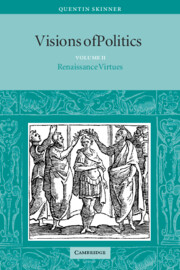Book contents
- Frontmatter
- Contents
- List of plates
- General preface
- Full contents: Volumes 1–3
- Acknowledgements
- Conventions
- 1 Introduction: The reality of the Renaissance
- 2 The rediscovery of republican values
- 3 Ambrogio Lorenzetti and the portrayal of virtuous government
- 4 Ambrogio Lorenzetti on the power and glory of republics
- 5 Republican virtues in an age of princes
- 6 Machiavelli on virtù and the maintenance of liberty
- 7 The idea of negative liberty: Machiavellian and modern perspectives
- 8 Thomas More's Utopia and the virtue of true nobility
- 9 Humanism, scholasticism and popular sovereignty
- 10 Moral ambiguity and the Renaissance art of eloquence
- 11 John Milton and the politics of slavery
- 12 Classical liberty, Renaissance translation and the English civil war
- 13 Augustan party politics and Renaissance constitutional thought
- 14 From the state of princes to the person of the state
- Bibliographies
- Index
- Plate section
6 - Machiavelli on virtù and the maintenance of liberty
Published online by Cambridge University Press: 05 September 2012
- Frontmatter
- Contents
- List of plates
- General preface
- Full contents: Volumes 1–3
- Acknowledgements
- Conventions
- 1 Introduction: The reality of the Renaissance
- 2 The rediscovery of republican values
- 3 Ambrogio Lorenzetti and the portrayal of virtuous government
- 4 Ambrogio Lorenzetti on the power and glory of republics
- 5 Republican virtues in an age of princes
- 6 Machiavelli on virtù and the maintenance of liberty
- 7 The idea of negative liberty: Machiavellian and modern perspectives
- 8 Thomas More's Utopia and the virtue of true nobility
- 9 Humanism, scholasticism and popular sovereignty
- 10 Moral ambiguity and the Renaissance art of eloquence
- 11 John Milton and the politics of slavery
- 12 Classical liberty, Renaissance translation and the English civil war
- 13 Augustan party politics and Renaissance constitutional thought
- 14 From the state of princes to the person of the state
- Bibliographies
- Index
- Plate section
Summary
James Harrington, meditating on the idea of a free state in his Commonwealth of Oceana in 1656, begins by suggesting that the theory and practice of government can be divided into two distinct historical periods. The first was initiated ‘by God himself in the fabric of the commonwealth of Israel’, and was ‘afterward picked out of his footsteps in nature and unanimously followed by the Greeks and the Romans’. This gave rise to the era of ‘ancient prudence’, an era in which the concept of political authority was analysed in terms of civic liberty and equality. Later, however, there followeda long and melancholy decline into the age of modern prudence, an age inaugurated by Julius Caesar when he overthrew ‘the liberty of Rome’ and thereby ‘opened up a pathway to the barbarians’, who eventually ‘deformed the whole face of the world’ with their ‘ill features of government’.
A determined effort has been made, Harrington goes on, to eradicate the features of ancient prudence from modern political thought. The leader of this destructive movement has been Thomas Hobbes, whose Leviathan Harrington treats as the greatest monument to gothic barbarism in the entire literatureon the art of government. Fortunately, however, there has been one modern commentator who has shown himself a ‘learned disciple’ of the Roman theorists, and has managed to preserve the fabric of ancient prudence in the face of modern vandalism.
- Type
- Chapter
- Information
- Visions of Politics , pp. 160 - 185Publisher: Cambridge University PressPrint publication year: 2002
- 11
- Cited by

